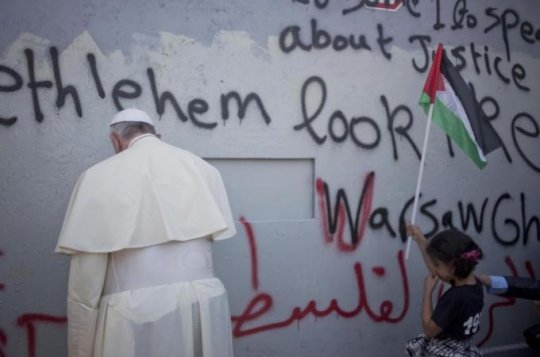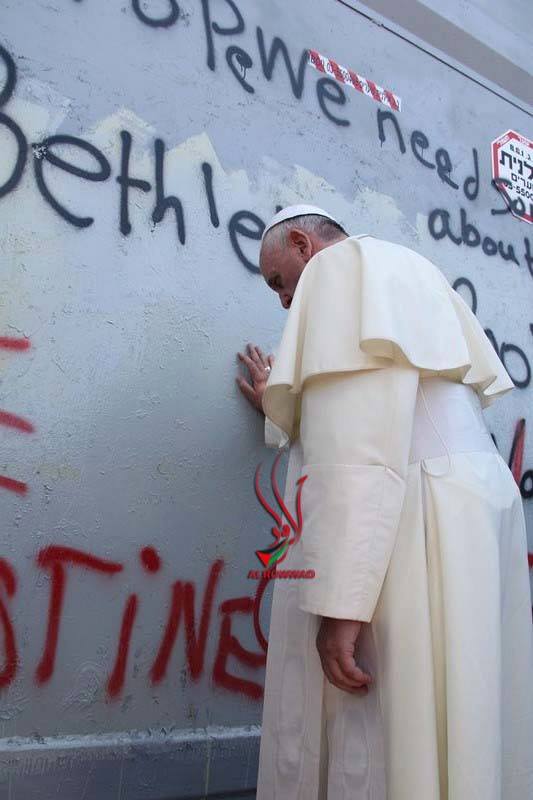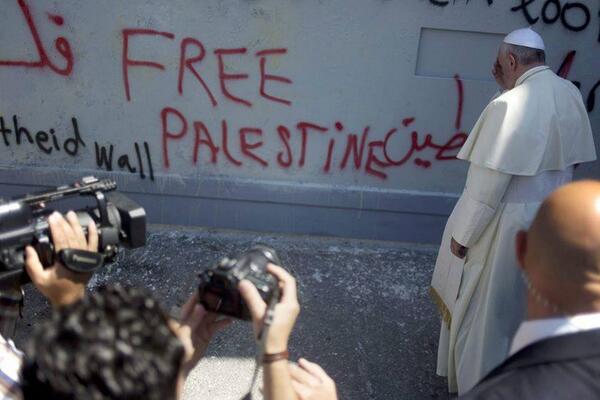Defying Israel, Pope Prays At 'Apartheid Wall'
By Lauren McCauley
26 May, 2014
CommonDreams.org

The pope praying next to the words: "Pope, we need someone to speak about justice." (Photo: AP)
During his historic trip to Bethlehem on Sunday, Pope Francis made waves after taking a surprise detour to pray at the wall separating Palestine from the state of Israel.
The stop at the barrier, also known as the "apartheid wall," was made on the second day of the pontiff's Middle East visit after touring Jordan on Saturday.
Describing the detour, the Guardian reports:
His route had been planned to pass close by the separation wall. Palestinian officials had hoped he might stop briefly to contemplate the Israeli-built structure, which weaves through the occupied West Bank, but instead the pope stopped his cavalcade, stepped out of the white, glass covered pick-up truck and made his way up to the wall, where he was quickly surrounded by children from the nearby Aida refugee camp.
Approaching the wall, which is close to the main Israeli checkpoint by Rachel's Tomb, the pope put his palm to the towering concrete structure, covered with graffiti appeals to the Palestinian cause, and bowed his head in prayer, flanked by two girls with Palestinian flags. The heads of Israeli soldiers were visible at the window of a nearby watchtower.
 Vatican spokesman Father Federico Lombardi said that the Pope's act of touching the wall was particularly notable.
Vatican spokesman Father Federico Lombardi said that the Pope's act of touching the wall was particularly notable.
"It was not a kiss or a blessing, it was a sign of contact and I think it was very significant way to demonstrate his participation in suffering," Lombardi said, adding, "it was done in a silent praying way, but without words. It was a profound spiritual moment in front of a symbol of division."
Ahead of the trip, many noted that the pope's decision to arrive first in the West Bank before Tel Aviv was in itself a "symbolic nod towards Palestinian statehood," as AP reported.
Others reacted online regarding the larger context of the prayer at the separation wall, saying it was "not an image Israel wanted."
Following his prayer, while speaking at Manger Square in Bethlehem alongside Palestinian President Mahmoud Abbas, Pope Francis invited Abbas and the President of Israel, Shimon Peres, to come to the Vatican join him in "heartfelt prayer to God for the gift of peace."
"For decades the Middle East has known the tragic consequences of a protracted conflict which has inflicted many wounds so difficult to heal," the pope said.
"Even in the absence of violence, the climate of instability and a lack of mutual understanding have produced insecurity, the violation of rights, isolation and the flight of entire communities, conflicts, shortages and sufferings of every sort," he added.
"In expressing my closeness to those who suffer most from this conflict, I wish to state my heartfelt conviction that the time has come to put an end to this situation which has become increasingly unacceptable. For the good of all, there is a need to intensify efforts and initiatives aimed at creating the conditions for a stable peace based on justice, on the recognition of the rights of every individual, and on mutual security."

The pope continued: "The time has come for everyone to find the courage to be generous and creative in the service of the common good, the courage to forge a peace which rests on the acknowledgment by all of the right of two states to exist and to live in peace and security within internationally recognized borders."
Both leaders have reportedly accepted the invitation.
This work is licensed under a Creative Commons Attribution-Share Alike 3.0 License.
Comments are moderated

